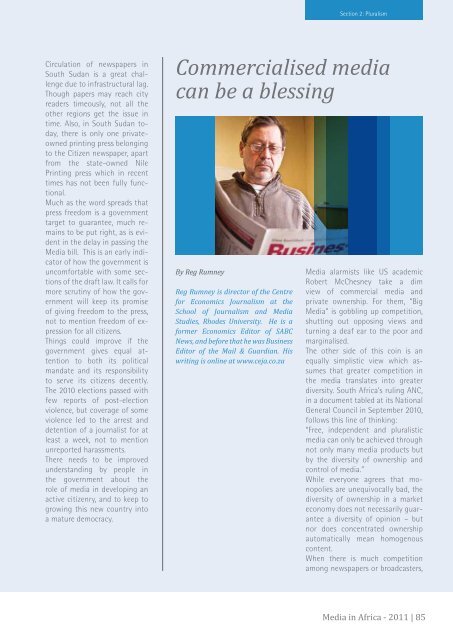Twenty years after the Windhoek Declaration on press freedom
Twenty years after the Windhoek Declaration on press freedom
Twenty years after the Windhoek Declaration on press freedom
You also want an ePaper? Increase the reach of your titles
YUMPU automatically turns print PDFs into web optimized ePapers that Google loves.
Circulati<strong>on</strong> of newspapers in<br />
South Sudan is a great challenge<br />
due to infrastructural lag.<br />
Though papers may reach city<br />
readers timeously, not all <str<strong>on</strong>g>the</str<strong>on</strong>g><br />
o<str<strong>on</strong>g>the</str<strong>on</strong>g>r regi<strong>on</strong>s get <str<strong>on</strong>g>the</str<strong>on</strong>g> issue in<br />
time. Also, in South Sudan today,<br />
<str<strong>on</strong>g>the</str<strong>on</strong>g>re is <strong>on</strong>ly <strong>on</strong>e privateowned<br />
printing <strong>press</strong> bel<strong>on</strong>ging<br />
to <str<strong>on</strong>g>the</str<strong>on</strong>g> Citizen newspaper, apart<br />
from <str<strong>on</strong>g>the</str<strong>on</strong>g> state-owned Nile<br />
Printing <strong>press</strong> which in recent<br />
times has not been fully functi<strong>on</strong>al.<br />
Much as <str<strong>on</strong>g>the</str<strong>on</strong>g> word spreads that<br />
<strong>press</strong> <strong>freedom</strong> is a government<br />
target to guarantee, much remains<br />
to be put right, as is evident<br />
in <str<strong>on</strong>g>the</str<strong>on</strong>g> delay in passing <str<strong>on</strong>g>the</str<strong>on</strong>g><br />
Media bill. This is an early indicator<br />
of how <str<strong>on</strong>g>the</str<strong>on</strong>g> government is<br />
uncomfortable with some secti<strong>on</strong>s<br />
of <str<strong>on</strong>g>the</str<strong>on</strong>g> draft law. It calls for<br />
more scrutiny of how <str<strong>on</strong>g>the</str<strong>on</strong>g> government<br />
will keep its promise<br />
of giving <strong>freedom</strong> to <str<strong>on</strong>g>the</str<strong>on</strong>g> <strong>press</strong>,<br />
not to menti<strong>on</strong> <strong>freedom</strong> of ex<strong>press</strong>i<strong>on</strong><br />
for all citizens.<br />
Things could improve if <str<strong>on</strong>g>the</str<strong>on</strong>g><br />
government gives equal attenti<strong>on</strong><br />
to both its political<br />
mandate and its resp<strong>on</strong>sibility<br />
to serve its citizens decently.<br />
The 2010 electi<strong>on</strong>s passed with<br />
few reports of post-electi<strong>on</strong><br />
violence, but coverage of some<br />
violence led to <str<strong>on</strong>g>the</str<strong>on</strong>g> arrest and<br />
detenti<strong>on</strong> of a journalist for at<br />
least a week, not to menti<strong>on</strong><br />
unreported harassments.<br />
There needs to be improved<br />
understanding by people in<br />
<str<strong>on</strong>g>the</str<strong>on</strong>g> government about <str<strong>on</strong>g>the</str<strong>on</strong>g><br />
role of media in developing an<br />
active citizenry, and to keep to<br />
growing this new country into<br />
a mature democracy.<br />
Secti<strong>on</strong> 2: Pluralism<br />
Commercialised media<br />
can be a blessing<br />
By Reg Rumney<br />
Reg Rumney is director of <str<strong>on</strong>g>the</str<strong>on</strong>g> Centre<br />
for Ec<strong>on</strong>omics Journalism at <str<strong>on</strong>g>the</str<strong>on</strong>g><br />
School of Journalism and Media<br />
Studies, Rhodes University. He is a<br />
former Ec<strong>on</strong>omics Editor of SABC<br />
News, and before that he was Business<br />
Editor of <str<strong>on</strong>g>the</str<strong>on</strong>g> Mail & Guardian. His<br />
writing is <strong>on</strong>line at www.ceja.co.za<br />
Media alarmists like US academic<br />
Robert McChesney take a dim<br />
view of commercial media and<br />
private ownership. For <str<strong>on</strong>g>the</str<strong>on</strong>g>m, “Big<br />
Media” is gobbling up competiti<strong>on</strong>,<br />
shutting out opposing views and<br />
turning a deaf ear to <str<strong>on</strong>g>the</str<strong>on</strong>g> poor and<br />
marginalised.<br />
The o<str<strong>on</strong>g>the</str<strong>on</strong>g>r side of this coin is an<br />
equally simplistic view which assumes<br />
that greater competiti<strong>on</strong> in<br />
<str<strong>on</strong>g>the</str<strong>on</strong>g> media translates into greater<br />
diversity. South Africa’s ruling ANC,<br />
in a document tabled at its Nati<strong>on</strong>al<br />
General Council in September 2010,<br />
follows this line of thinking:<br />
“Free, independent and pluralistic<br />
media can <strong>on</strong>ly be achieved through<br />
not <strong>on</strong>ly many media products but<br />
by <str<strong>on</strong>g>the</str<strong>on</strong>g> diversity of ownership and<br />
c<strong>on</strong>trol of media.”<br />
While every<strong>on</strong>e agrees that m<strong>on</strong>opolies<br />
are unequivocally bad, <str<strong>on</strong>g>the</str<strong>on</strong>g><br />
diversity of ownership in a market<br />
ec<strong>on</strong>omy does not necessarily guarantee<br />
a diversity of opini<strong>on</strong> – but<br />
nor does c<strong>on</strong>centrated ownership<br />
automatically mean homogenous<br />
c<strong>on</strong>tent.<br />
When <str<strong>on</strong>g>the</str<strong>on</strong>g>re is much competiti<strong>on</strong><br />
am<strong>on</strong>g newspapers or broadcasters,<br />
Media in Africa - 2011 | 85












